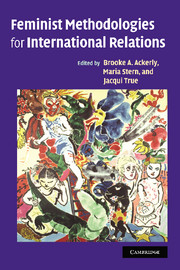Book contents
- Frontmatter
- Contents
- Notes on the contributors
- Acknowledgments
- 1 Feminist methodologies for International Relations
- Part I Methodological conversations between feminist and non-feminist IR
- Part II Methods for feminist International Relations
- Part III Methodologies for feminist International Relations
- Conclusion
- Bibliography
- Index
1 - Feminist methodologies for International Relations
Published online by Cambridge University Press: 12 January 2010
- Frontmatter
- Contents
- Notes on the contributors
- Acknowledgments
- 1 Feminist methodologies for International Relations
- Part I Methodological conversations between feminist and non-feminist IR
- Part II Methods for feminist International Relations
- Part III Methodologies for feminist International Relations
- Conclusion
- Bibliography
- Index
Summary
Over the past two decades feminism has made refreshing, often radical contributions to the study of International Relations (IR). Feminism is no longer a rare import but a well-established approach within IR, as its inclusion in the core texts and scholarly collections of the field testifies. IR students today benefit from the theoretical and empirical space opened up by feminist scholars. Since the late 1980s, feminist scholars have paved the way for serious engagement with gender and theory in a previously gender-blind and theoretically abstract IR field. Despite its increasing recognition, however, the progress of feminist international relations scholarship has been far from straightforward. In a state-centric discipline that is notorious for its lack of self-reflection, developing feminist methodologies and conducting feminist research have been major challenges. However, since all power relations are essential to feminist perspectives and to the feminist research process, feminist methodologies are highly relevant for the study of global politics.
Feminist Methodologies for International Relations offers students and scholars of international relations, feminism, and global politics practical insight into the innovative methodologies and methods that have been developed – or adapted from other disciplinary contexts – in order to do feminist research for IR. Beginning with the first wave of feminist IR, scholars have been making theoretical breakthroughs. Attention to methodology has been vital to the development of feminist IR as a diverse, varied, and collective inquiry. While feminist research methods have been the subject of informal discussions, these have been largely unpublished.
- Type
- Chapter
- Information
- Feminist Methodologies for International Relations , pp. 1 - 16Publisher: Cambridge University PressPrint publication year: 2006
- 30
- Cited by



